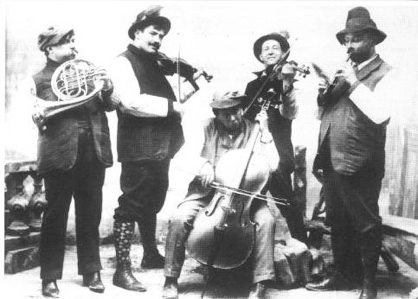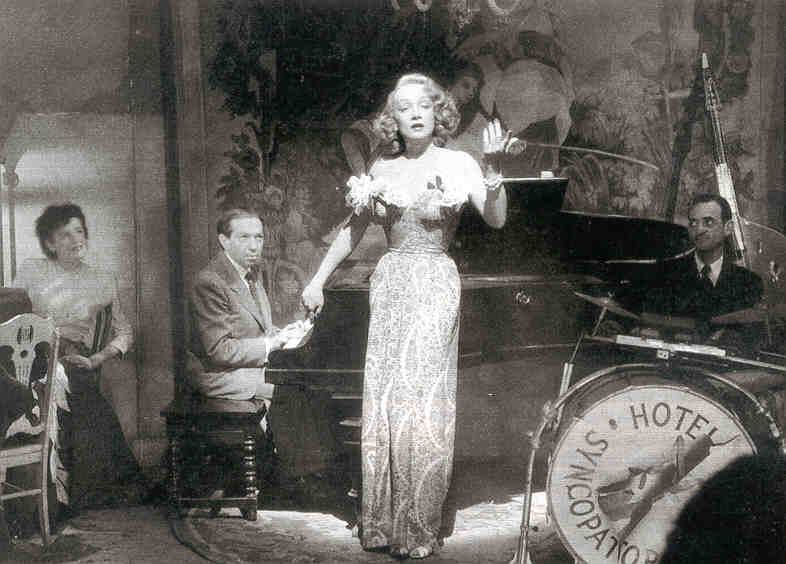If you want to visit the coffeehouse,
If the cabaret might be your thing,
If you'd like to see the Strauss Ensemble performing,
Come on in, we're at your service.
All your cares will disappear,
Here, in this beautiful little space—
But you need to keep one thing in mind,
Just how to get out of here.
(Leo Strauss, "Einladung/Invitation," Terezín ca. 1944)

In Nuremberg they've passed a law,
Giving women cause to weep,
Who had been sleeping with the
wrong man.
"The price of meat's going up in
the city shops,
The drums beat louder every day,
God in heaven, if there's something
you've not done,
Do it right away."
(Hanns Eisler / Bertolt Brecht, "Die Ballade der 'Judenhure' Marie Sanders" [The ballad of the 'Jewish whore' Marie Sanders])
Recordings courtesy of Cedille Records. All rights reserved.
It is to cabaret's ability to turn worlds inside-out that I here call "the cabaretesque," a term that extends Mikhail Bakhtin's well-known concept of the carnivalesque. The cabaret stage depends on the inversion of inside and outside, the ways in which a skit or song allows the audience to experience themselves upon the stage without, however, entirely recognizing themselves. Audience members laugh at their own foibles and follies. They encounter themselves in a moment of self-reflection. The serious is made comic; the comic is made serious. The irony of an evening of enjoyment, as Leo Strauss invites us to experience, is revealed in the difficulty of escaping that moment when sounded in the real world.
The outer and inner worlds of the cabaretesque collide in Hanns Eisler's setting of Bertolt Brecht's "The Ballad of the 'Jewish Whore' Marie Sanders." Eisler (1898–1962) captures the form and narrative of broadside ballad—songs that detail the politics of the day and circulate in printed form on the streets of the city—to open a space for Marie Sanders to enter the public sphere in which she is mocked and driven from the city because she has a Jewish lover. Sound in all its dimension—lyrics, genre, intertextuality, arrangement of the score for cabaret ensemble—unleashes its reality to locate it in the historical moment of the Nuremberg Laws. In successive verses, reality unfolds sonically as broadside and newsreel converge. Aesthetically, the hideous reality of prejudice and racism becomes transcendent as a song of stunning beauty.
Although Marie Sanders herself never speaks in the song, we yearn to hear her voice. The serious work of cabaret resonates most clearly through the sounding of silence. It was the possibility of reclaiming silence for the marginalized that led to the spread of cabaret in the Jewish communities of the modern era, above all as they were forced to flee the traditions of an older world and embark on exile into a new world. These modern stories fueled the repertories of the cabaretesque, which were transformed into the Yiddish theater, operetta, and the film music of modernity. There were new voices and new songs to take up the cause of denying finality. The silence of modernity was sounded with a fullness that might seem to forestall the end of all things.

Want to buy some illusions?
Slightly used, second-hand?
They were lovely illusions,
reaching high, built on sand.
They had a touch of paradise,
a spell you can't explain.
For in this crazy paradise
you are in love in vain.
Want to buy some illusions,
slightly used, just like new?
Such romantic inclusions, and
they're all about you.
I sell them all for a penny, they
make a pretty souvenirs.
Take my lovely illusions, some
for laughs, some for tears.
(Friedrich Holländer, "Illusions," from A Foreign Affair, dir. Billy Wilder, 1948)
Recordings courtesy of Cedille Records. All rights reserved.
The power of Jewish cabaret and the cabaretesque to sound silence appears in remarkable ways across the history of media technology, particularly in the history of film. The history of sound film begins on a musical stage indebted to the long history of Jewish cabaret. In the first synchronized sound film, Alan Crosland's 1927 The Jazz Singer, the title character, Jakie Rabinowitz, takes to the stage as Jack Robin, enacting and envoicing the struggle between Jewish tradition in Samson Raphaelson's The Day of Atonement. The jazz singer inhabits the multiple worlds of the cabaretesque—as Al Jolson / Jakie Rabinowitz / Jack Robin—turning each inside-out through the transformation of speech (still silent in the film) into music. The jazz singer's musical transition from stage to film formed at the confluence of real-life transitions for European Jews at the beginning of the twentieth century—migration from rural shtetl to urban ghetto, immigration from the Old World to the New—and of allegorical transitions—from religious Orthodoxy to modern secularism, from Diaspora to cosmopolitanism. As the old order of European empire collapsed in the wake of World War I, the Jewish musical traditions gathered new metaphors of modernity and modernism, ripe for the tales migrating from the skits of the cabaret stage to the scenes filling the frames of sound film.
The Jazz Singer was followed five years later in Berlin by Josef von Sternberg's 1930 Der blaue Engel (The blue angel), the first German-language synchronized sound film, and once again modernity was sounded on the cabaret stage. The Blue Angel of the film's title (based on Heinrich Mann's 1905 novel, Professor Unrat) was itself a cabaret, and most of the music was filmed diegetically in the Blue Angel, performed by Marlene Dietrich and Friedrich Holländer's jazz band, Weintraub's Syncopators. Jewish cabaret would sound historical silence again—and composed again by Friedrich Holländer (1896–1976) for performances by Marlene Dietrich in the Lorelei cabaret in Billy Wilder's 1948 A Foreign Affair. The historical arc from the cabaret stage of the Blue Angel to that of the Lorelei, from the eve of Nazism to the wake of the Shoah, once again is sounded as film music from which Jewish cabaret is inseparable, just as reality has collapsed into illusion.
So very gently
My heart longs
To take the journey
Back home. . . .
To hear the music
Playing in my own home,
Just as it was sung
By Oscar Straus.
(Leo Strauss, "Aus der Familie der Sträusse" / "From the Strauss Family," Terezín ca. 1944) (Migdal 1986, 67–70)
Recording courtesy of Cedille Records. All rights reserved.
The voice of Leo Strauss closes this essay again as at the beginning, in both instances from the final collections of cabaret songs he left in Terezín before his own deportation and murder in Auschwitz. The search closure in the closing epigraph—the sound of his own father's voice, at home, not from the cabaret stage—proved to be as inchoate as it was impossible. Closure, however, may never be fully accomplished by the cabaretesque. The silence it would seem to secure is one that Jewish cabaret seeks instead to undo by insisting that silence must be sounded again and again. It is with and through sound that cabaret realizes the very Jewishness from which modern history is inseparable.
Source for Leo Strauss lyrics: Migdal, Ulrike, ed. Und die Musik spielt dazu: Chansons und Satiren aus dem KZ Theresienstadt (Munich: Piper, 1986).

